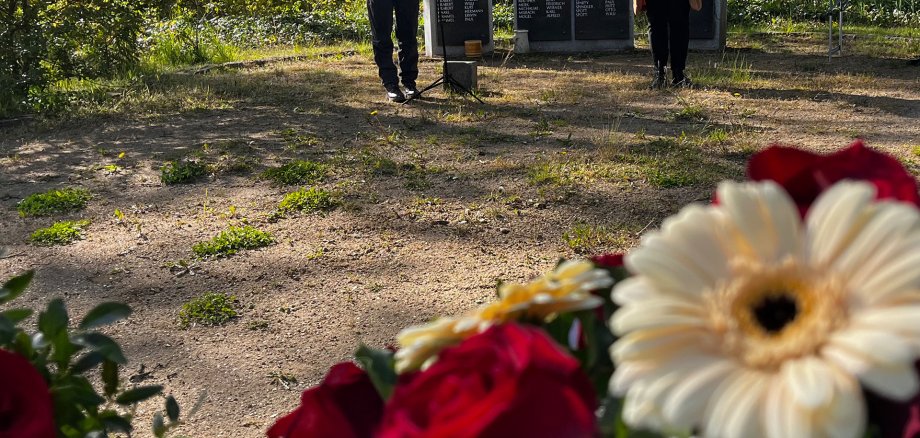Speech by Mayor Sabine Löser on Liberation Day at the memorial in Hennickendorf
Ladies and Gentlemen,
On 19 April 1945, the first mourning ceremony for the dead of the Buchenwald concentration camp took place on the roll call square near Weimar. The commemoration was organised by survivors on behalf of the International Camp Committee. The memorial was a wooden obelisk made in the camp workshops with the inscription "K.L.B. 51.000" - Buchenwald Concentration Camp - 51,000 dead in this camp alone.
The survivors marched in blocks, organised by nation, to the sound of the camp orchestra on the roll call square. The commemorative speech, prepared in the various languages, culminated in a joint pledge:
"The final destruction of Nazism is our slogan. The building of a new world of peace and freedom is our ideal."
The slogan became known as the Buchenwald Oath.
And now, 78 years later, a letter from teachers at a school in Burg - just over 100 kilometres away - has dominated the news in recent days:
A pupil stands in front of his PE teacher and raises his arm twice in a Hitler salute; several people saw the incident. The teacher in front of whom the incident happened told the headmistress a short time later that he had seen nothing. Another pupil from the same school shouts "Arbeit macht frei!" when he is expelled from the classroom. In winter, teachers have found swastikas drawn in the snow on their car bonnets.
I was told at the weekend that on Friday at the roundabout in Hennickendorf, a cyclist was seen greeting an apparent acquaintance in a car with a clear Hitler salute.
These examples from the recent past and from our immediate surroundings show that the oath of Buchenwald is still compellingly justified today, 78 years later. They confirm the statement in the latest report by the Brandenburg Office for the Protection of the Constitution: "In addition to a significant increase in Reich citizens and self-administrators, right-wing extremism currently remains at the second-highest level in the history of our country."
All the suffering, the inhuman ideology, the mass, systematic and industrialised murder must never be forgotten. Theodor Adorno summarised it very clearly: "The aim of all education must be to ensure that Auschwitz is not repeated."
That's why it's so important to keep the moments of remembrance in all the daily challenges we face. To carry on where all this leads.
To talk about the dangers of words, linguistic intensification and radicalisation.
Many contemporary witnesses who reported on the beginnings of the National Socialists' seizure of power, the developments in the 1920s, the economic unrest and the intensifying debates used the word "tipping". Moods that suddenly "tip" and are directed against minorities and individuals, which caused a previously seemingly stable society to "tip". Opening the door to hatred and agitation.
It is a misconception to firmly assume that these horrors cannot happen again. The Italian writer and Auschwitz survivor Primo Levi put it in a nutshell: "It happened, and therefore it can happen again: Therein lies the essence of what we have to say. It can happen again, anywhere."
And so, on 8 May, we must thank the liberators from East and West for freeing Germany from the reign of terror of National Socialism. Today, however, we must also realise once again that our democracy, the free order, is not a given. It is vulnerable and must be defended every day. Racism, marginalisation and inhumane statements must be confronted head-on. Our democracy may have its weaknesses, and we need to work on them. But it is by far the best conceivable form of government and society to date. It is the responsibility of all of us to preserve it.
Thank you very much.

